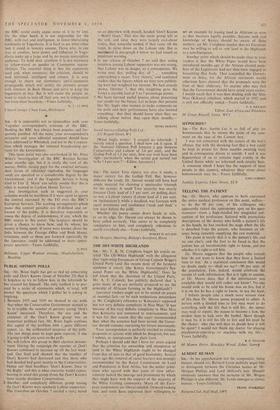TELLING THE PATIENT
SIR.—Dr. Moore, who appears to have canvassed the entire medical profession on this point, suffers— as do the 90 per cent. of his colleagues who apparently ticked the appropriate spot on his ques- tionnaire—from a high-minded but misguided con- ception of his profession. Satiated with journalistic descriptions of the doctor who holds a patient's life in his hands, he has reached the stage when the life is detached from the patient, who becomes an ob- scure being remotely supplying the raw material.
The point is surely that it is the patient's life and no one else's, and the fact to be faced is that the patient has an incontestable right to know, and not whether it is right to tell him.
Dr. Moore suggests that the people who consult him 'do not want to know that they have a limited time to live.' As a statistical conclusion this would no doubt apply to—shall we say?-90 per cent. of the population. Few, indeed, would celebrate the receipt of such information. But is it right to assume, as Dr. Moore does, that if the information was available they would still rather not know? No one would wish to be told his house was on fire, but if it is on fire he has a right to know, to say the least.
I believe people take a much more serious view of life than Dr. Moore seems prepared to admit. A person with a limited time to live may want to do something with the life that is still his: the sinner may wish to repent, the mouse to become a lion, the modest man to kick over the bushel. Short though it may be, it is still his life to live and his must he the choice: who else will dare to decide how it will be spent? 1 would not thank my doctor for playing psychiatrist-cum-dens ex machina, with my life.— Yours faithfully, R. G. WEAVER 08 Manor, Drive, Hinchley Wood, Esher, Surrey






































 Previous page
Previous page